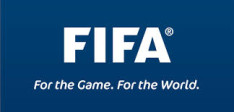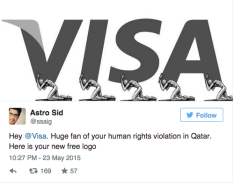If fans want to hit FIFA where it hurts they should look at their media deals, not sponsors
 While sponsors have been urged to boycott FIFA the media, which pays billions for World Cup rights, are the ones that carry real power for reform argues Andrew Woodward.
While sponsors have been urged to boycott FIFA the media, which pays billions for World Cup rights, are the ones that carry real power for reform argues Andrew Woodward.
The events and subsequent coverage over the last week of the various shenanigans involving FIFA and its band of merry men and women have been remarkable, astonishing and concerning on so many fronts.
But as one of the relative few who has seen all of this on the inside, I must say I am somewhat bemused by the witch-hunt against sponsors.
 I work in marketing, communications and public affairs and part of my career saw me carry a Visa Inc business card as global head of brand and sponsorship communications, based in San Francisco, looking after “PR” for the Olympics, FIFA, NFL and MLS sponsorships. Last week when the FIFA arrests story broke, hordes of public and media marched toward sponsors, including my former employer, brandishing torches and pitchforks.
I work in marketing, communications and public affairs and part of my career saw me carry a Visa Inc business card as global head of brand and sponsorship communications, based in San Francisco, looking after “PR” for the Olympics, FIFA, NFL and MLS sponsorships. Last week when the FIFA arrests story broke, hordes of public and media marched toward sponsors, including my former employer, brandishing torches and pitchforks.
There is still pressure was on sponsors to “dump FIFA” and more.
I wrote last week that any sponsor who considered dumping their sponsorship would be mad. I also cautioned sponsors to think long term and big picture by not coming out too strongly against FIFA or making themselves the story. As I hit ‘send’ on my piece, so too did some of them on their public statements. Too late. They have made themselves the target.
Since last Wednesday I have done many interviews on the matter. People continue to miss the point on sponsors. Quite simply, they’re not the sole holder of power here. People are ‘barking up the wrong tree’. There are a few other trees to ‘bark up’ first.
Some of the media reports over the past week have correctly stated that FIFA received $1.63 billion (all figures in US dollars) from sponsors. That’s how much income FIFA received from 2011 to 2014 from sponsors like Coca Cola, Adidas, Kia Hyundai, Emirates, Sony, McDonalds and Visa.
It is a big chunk of money. But guess what? FIFA’s income over the same period was $5.14 billion. Where does the other $3.51billion come from?
Well, $1.02 billion comes from hospitality, licensing and “other” sources (let’s not rat-hole about ‘other’ right now).
That leaves $2.48 billion left. Where does that come from. OMG… it comes from the media! Yes, that’s right, the fourth estate forked out just under $2.5 billion to show the greatest sports show on earth. It is FIFA’s single largest income line item.
Some of these media organisations are government or public funded (like the BBC in the UK, CBC in Canada and SBS in Australia) while others are commercial enterprises and, of course, make profits from selling advertising within broadcasts. Where’s the outrage against the media?
It is becoming more lucrative too. In the United States, football, or soccer as they call it, ranks behind baseball, American football, basketball and hockey in most of the mainstream performance measures. ‘Soccer’, however, is lucrative and becoming more so, indeed the USA is FIFA’s fifth biggest TV rights revenue market. A decade ago, ESPN paid about $100 million to show the 2010 and 2014 tournaments in English in the USA. According to the Guardian, “In 2011, Fox won English-language rights for 2018 and ‘22 on $425m bid”. That’s more than four times as much as ESPN paid! More recently, FIFA granted Fox the 2026 tournament without going through a bidding process. Fox is owned by Rupert Murdoch’s News Corporation – an organisation, which, according to the Leveson Inquiry, is in the same ethics league as FIFA.
In all of the latest rumpus, we haven’t heard anything from anyone, let alone the media themselves, calling on their brethren to act. Focussing on the sponsors alone is lazy advocacy by FIFA’s critics and contemptible journalism of the highest order.
If the public and media want change, they could start by taking the matter up with their elected representatives who in turn could urge their governments to undertake ‘sports diplomacy’ with the mainly African, Asian and South American nations that back Blatter and the current regime.
The public and political leadership could extend this to pressuring media organisations. The public, government and media, as a part of its advocacy mix, could lobby the sponsors and non-sponsors, asking them to withdraw and or not support rights holding media.
Yes, I am being delusional here. Let’s be real, none of this is going to happen. TV revenues are up; player participation is up; sponsor revenue for most football assets is growing and, attendance and viewership numbers continue to grow.
Last week, I copped some criticism for saying the public doesn’t care about corruption in football. I stand by this claim. Evidence? On Saturday night, over 70,000 people attended the Olympic Stadium in Sydney to see a reserve grade level Sydney FC play a touring Tottenham Hotspur. The same venue on Tuesday night will see its ground record broken for any form of football when over 80,000 top dollar paying people again see Sydney FC in action, this time taking on EPL champions Chelsea as a part of its end of season global jolly.
None of this makes what’s happening at FIFA right. It doesn’t. There’s no doubt, FIFA needs a new leadership, governance and positioning. Change will happen, in good time, as it did with the Olympic movement, starting in the late nineties.
In addition to the leadership and governance issues, FIFA also needs to use this current period to make some hard decisions about the 2022 FIFA World Cup, currently scheduled for staging in Qatar. There are serious questions about the awarding of rights; it defies logic on geographic, demographic, climate, facilities and scheduling grounds and, construction is problem plagued. It will remain a brand, reputational, logistical and game-integrity issue for FIFA and its commercial partners for as long as it remains scheduled for staging there.
So where does all of this leave all of the sponsors?
As I said, they best just sit tight, keep their heads down and say the bare minimum. It would be an act of madness to dump a FIFA World Cup sponsorship. Any overt ‘tutt-tutting’ of FIFA is ill-advised. It will cost them in the long run. Sponsors need to think strategically, long term, big picture and rationally. They need to put their customers, clients and shareholders first.
Sponsoring the FIFA World Cup and football on the whole remains a great investment for a couple of reasons. As I said last week, the public ‘gets it’ but remains largely uncaring about the governance of football. They just want to watch football and lots of it. In a sponsorship sense, people as a whole feel more favourably to those that support football than those that don’t.
Second, if you jump ship, a competitor will move in. Simple as that. Why open that door?
Thirdly, sponsorship, well executed, has a better return on investment than conventional marketing. Finally, in a week or two, this rumpus will blow over and there will be something else occupying the headlines and the media and public will pester someone else.
There are a few other reasons too.
First, if a company has been a sponsor of the FIFA World Cup in two tournaments over the last eight years they and their clients have probably invested around $1 billion in rights fees and activations (and for some companies, partner activations, over this period of time). Why would you walk away from that billion dollar investment? Why, so you can put out a media release full of corporate righteousness and sundry claptrap? Get real.
 Second, the showpiece FIFA sponsorship property is the men’s World Cup and that’s not on again until mid-2018 – three years away by my count. Yes, there are ‘second tier’ FIFA tournaments like the Women’s World Cup which starts this week in Canada (and this is emerging as a great property on its own) but in reality any sponsor won’t be very visible on the “FIFA World Cup” until early 2018 (and generally after the Winter Olympics in the first quarter of the year). The football governance landscape will be a lot different by then.
Second, the showpiece FIFA sponsorship property is the men’s World Cup and that’s not on again until mid-2018 – three years away by my count. Yes, there are ‘second tier’ FIFA tournaments like the Women’s World Cup which starts this week in Canada (and this is emerging as a great property on its own) but in reality any sponsor won’t be very visible on the “FIFA World Cup” until early 2018 (and generally after the Winter Olympics in the first quarter of the year). The football governance landscape will be a lot different by then.
Thirdly, the FIFA World Cup will become an even more valuable property in a few years time. Based on the published figures, FIFA’s four year sponsorship market value was $1.6 billion. The 2011 to 2014 figures came at a time when companies were emerging from the global financial crisis and FIFA was (and remains) in a perpetual state of crisis thanks to shenanigans involving senior office bearers and the host city selection process and outcome. The events of the last week will force change. FIFA is on notice – serious notice.
Nothing focuses the mind like the potential to go behind bars and what happened this week will force change in leadership, bidding, governance and transparency. Think of how valuable a property will be when all of this is fixed, as the Olympics did. I can’t say how much more valuable it will be. What I do know is that it has to be, by logic, more valuable, a lot more, than it is now. Why would you want to miss that opportunity? As I said, it would be madness. This is the time to strike and lock in for the long term. Play your cards right and you will get a great deal at a great price on a great property. That’s good business for your revenue, customer engagement and brand equity.
As both a football fan and a marketer, I cringed when I awoke on Saturday to see a a triumphant Blatter concluding his victory speech chanting “Let’s go FIFA! Let’s go FIFA!”.
I can understand why this would make even the most hardened sponsor question their decision to stay or get involved.
I can understand why people think sponsors can be a force for change. Sponsors are the easy target. They have, however, a small role to play, in bringing about change.
Football will survive this crisis. Football will out-live the reign of Sepp Blatter. Football will get the shake-up it has to have. From this, the ‘beautiful game’ will enter a new era and be the most sought after and competitive sports sponsorship property in the world.
- Andrew, Woodward, sports marketing consultant and former global lead of Visa Inc’s brand and sponsorship communications.






I think the issue Andrew is that media organisations aren’t saying “hey we love football so you should love us” in the same way brands do with sponsorship. Media is usually just seen as a “pipe” by consumers. They engage with channels if they serve the content they want. Like Soccer. So to equate the role of sponsorship and media rights is a little like comparing things that can’t really be compared. Consumers need media to air their passion. They don’t need brands to sponsor it. Hence my view, but mere opinion at this point, is that consumers may well resent brands that sponsor a corrupt organisation who brings their favourite game into disrepute. They are less likely to stop watching it on TV. Or dislike the channel as a result. Football may well be the biggest sponsorship in the world. But brands do have other choices. If they see consumer resentment of them part funding FIFA they can and should exit fast. It’s not about ‘punishing’ FIFA it’s about protecting your brand. I await some actual brand sentiment tracking with bated breath.
User ID not verified.
“the public doesn’t care about corruption in football. “I stand by this claim. Evidence? On Saturday night, over 70,000 people attended the Olympic Stadium in Sydney to see a reserve grade level Sydney FC play a touring Tottenham Hotspur.” – This is quite possibly the most ridiculous statement I’ve ever read.
The very reason people care about corruption is because they care about the game. If it was corruption in the Badminton Association I’d be less concerned.
What’s the correlation between supporting your A League side and FIFA corruption?
I’m three or four steps removed from FIFA when I buy a ticket.
I don’t stop voting or believing in democracy because of political corruption why should Football be any different? And yes I will stop using VISA if they knowingly sponsor a corrupt organization. Why? Because it’s their money funding things directly and I don’t have to give them any more of mine if I don’t want to.
User ID not verified.
Good follow-up, Woodie.
Everybody knows that the choice of Qatar could not have been made without some serious money changing hands; No right minded person would agree to stage a World Cup there in such heat (or are there those among the FIFA organisation who think the climate will change dramatically, miraculously even, before the kick-off?).
If Blatter is the Mr Clean that he likes to portray at press conferences, maybe he should call for a change of venue, giving whatever reason he will: along with evidence of substantial payments by Qatar to the families of ‘expat’ workers who have died working on building the Qatar stadium. That would be a start; he might oblige the sporting world then by professsing he is ill (a septic bladder?) and is stepping down for health reasons.
Or am I being naive (as well as outraged)
User ID not verified.
That’s why it is called the 3rd World Game – ethics be damned.
User ID not verified.